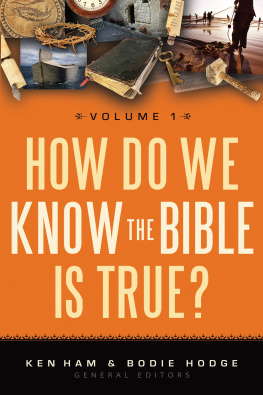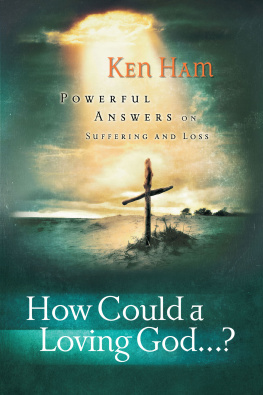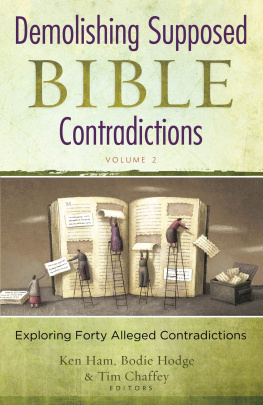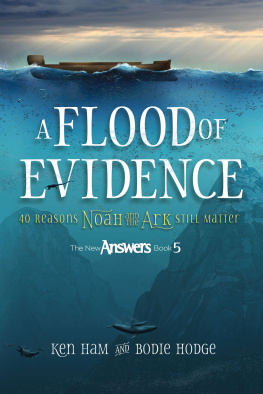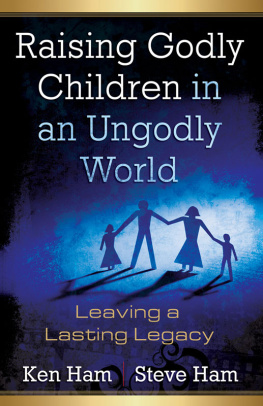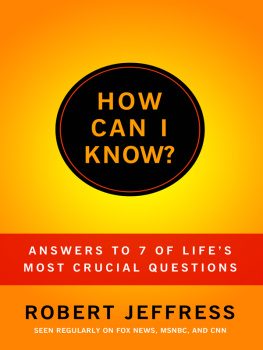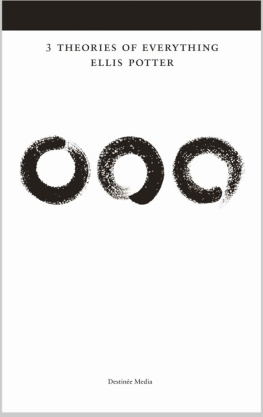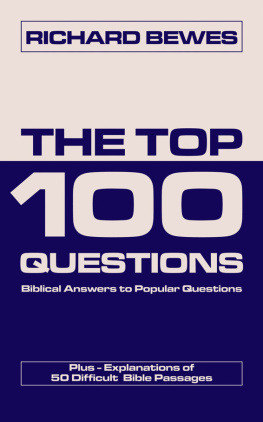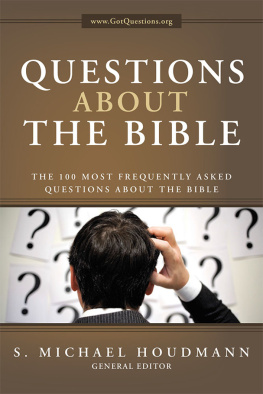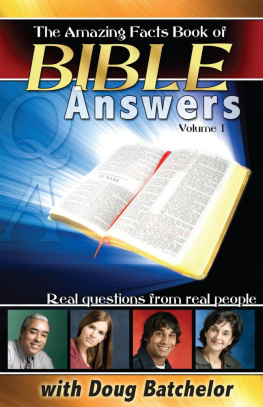Walking Through Shadows
Finding Hope in a World of Pain
Ken Ham
Carl Wieland
First printing: July 2002
Copyright 2002 by Master Books, Inc. All rights reserved. No part of this book may be used or reproduced in any manner whatsoever without written permission of the publisher, except in the case of brief quotations in articles and reviews. For information write: Master Books, Inc., P.O. Box 726, Green Forest, AR 72638.
ISBN: 0-89051-381-3
Library of Congress Catalog Card Number: 2002105386
Bible quotations are mainly from the New International Version, Zondervan, Grand Rapids, MI.
Printed in the United States of America.
Please visit our website for other great titles:
www.masterbooks.net
For information regarding author interviews, please contact the publicity department at (870) 438-5288.

This book is dedicated to all those members of each of our families that have suffered so much through the events described herein. We want to especially acknowledge the anguish of our dear mothers, as they watched the suffering of those they brought into the world. It is our prayer that millions may read this book and gain salvation and comfort in a dying world.
Contents
Foreword
Why do righteous people suffer? Why do the worst things sometimes happen to the best of people? Those questions go to the heart of one of the most difficult and most persistent of all metaphysical problems.
It is also one of the oldest dilemmas facing the human race. The Book of Job probably the earliest book in the Old Testament canon was written to explore those very questions. Jobs experience not only gives us a window into the workings of the spirit world; it also reminds us that even in the midst of our sufferings, God is worthy of our praise. In fact, suffering properly viewed is a reason to praise God, not to doubt Him. In the end, God reminds Job that as Creator and Lord of all, He is utterly sovereign and has every right to do whatever He chooses without needing to justify himself to anyone. He isnt obligated to answer all the questions we raise. He doesnt owe us any explanations.
And yet God has graciously given us much in the way of revealed truth and precious promises that can help us understand and endure our sufferings. Consider, for example, what God has told us about himself: He is good. He is pure light in whom there is no darkness at all. He is worthy of our absolute trust and loyalty. He is gracious and full of tender mercy. He sovereignly controls everything that happens, so that no matter how chaotic and turbulent the circumstances of life may seem, were not to think God has lost control. He limits our temptations to no more than we can endure, and He provides a way of escape from all evil enticements. He gives us grace to endure the trials of life, and strength and comfort to withstand the pain of suffering. He never changes, never wavers, never slumbers or sleeps and never lets even the tiniest sparrow out of His sight. Best of all, He promises to make all things work together for the ultimate good of those who love Him.
All those things are germane to the problem of suffering. Anyone who genuinely believes those truths and trusts those promises ought to find them sufficient even if not completely satisfying to our intellectual curiosity.
But sometimes our trials are so grievous, and evil circumstances seem so oppressive, that our emotions overwhelm our minds, and what we feel dominates and threatens to overcome what we know. Every thoughtful person at one time or another will still long for a better understanding or a more thorough explanation of why God allows so much suffering. That is especially true in this era of war, suicide bombings, and terrorist attacks.
Ken Ham and Carl Wieland have written this book to address these difficult issues. They write with passion and empathy, as only those who know suffering firsthand can do. They also write with sound biblical insight, allowing the clear light of Scripture to illuminate the dark corners of the problem of suffering.
Scripture says one of the reasons God allows us to suffer is so that He can comfort us and thus equip us to comfort others in their suffering (2 Cor. 1:3-4). Ken and Carl have found rich consolation from the heart of God in their own sufferings, and one of the beautiful fruits of that suffering is this book. Many will find it a rich source of comfort and encouragement in the midst of their trials. Others will find biblical help for questions that may have long troubled them. All will be reminded of the goodness of God to His people and His precious promise that the sufferings of this present time are not even worthy to be compared with the glory that will be revealed in us throughout all eternity.
John MacArthur
Pastor, Grace Community Church
Sun Valley, California
Part One
Calamity in the Outback
Carl Wieland
Chapter 1
Lifes Sudden U-turn
Plastic surgeons can do wonderful things these days. Biting her trembling lower lip as she held the mirror in front of me, my mother was fighting back the tears as she spoke. The grotesque visage within the frame slowly came into focus; that was supposed to be me, but I couldnt recognize me. One-half of this misshapen countenance was facing me, the other half staring off askew in another direction altogether. The glazed, sunken eye belonging to that disconnected half was sitting at a different level to the other eye. Instead of a nose, this alien face had a narrow, flat sliver of skin, with one nostril opening at its base.
Nearly all the facial contours that make us each recognizably unique cheekbones and the like had been smashed and distorted by massive impact. My nose had been largely torn off. Despite my medical training, I was not in a frame of mind for dispassionate analysis of my injuries. A numb horror fought for dominance with the infused narcotic medication clouding my consciousness. I couldnt speak because of the tracheotomy tube entering my throat. All I could weakly scrawl on the piece of paper in front of me was, Looks like the man from Mars. I sank back into the bed of the hospital I would inhabit for the next half-year or so.
The painkilling drugs were not the only thing making me mercifully hazy I had not long emerged from several days of unconsciousness in intensive care. I was only gradually beginning to piece together, from what my family was telling me, what had happened to put me here.
For some 13 years I had been a family doctor. Now, at the age of 36, I had suddenly become an avid consumer, instead of a provider, of medical care. All the result of a split-second highway impact in which my four-wheel-drive vehicle had collided with a fully-laden fuel tanker at a combined impact speed of 110 mph (180 kph).
My wife had a serious medical condition at the time, which seemed to be partially relieved in steamy tropical weather. To help relieve, even if only a little, this distressingly painful syndrome, we had decided to move to Cairns, in Australias tropical far north, to start over. Our house and my practice in South Australias capital, Adelaide, had sold readily. We had already bought a house in Cairns and sent our furniture on ahead. Little did we know that it would take over six months before we would catch up with our possessions again.
The plan was that we would take our two cars up to Cairns via the central Australian outback. For the first leg, about 900 miles (1400 km), we would travel on the famous Ghan train, which took cars as well, to Alice Springs. We really looked forward to driving the remaining 1,500 miles (2400 km), especially the first part in the remote Northern Territory. We knew and loved the lonely outback highways; the vast desert flatness stretching to the horizon, hour after hour with seldom a vehicle; the brilliant reddish-purple desert dawns silhouetting scraggly excuses for trees; the occasional eagle looking up from its feast of road-kill kangaroo.
Next page

